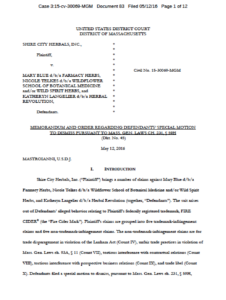MA Anti-SLAPP Law Applied in the Context of Trademark Challenge
Blog – Cyberlaw Clinic 2016-05-18
 Rebecca Tushnet wrote a nice summary of the decision of the United States District for the District of Massachusetts in Shire City Herbals, Inc. v. Blue, Case No. 3:15-cv-30069-MGM (D. Mass. May 12, 2016). No need to restate the facts or the holding, but I wanted to pile on with some local context and a quick acknowledgment that this seems like an important decision for proponents of Anti-SLAPP protections for speakers in the Commonwealth.
Rebecca Tushnet wrote a nice summary of the decision of the United States District for the District of Massachusetts in Shire City Herbals, Inc. v. Blue, Case No. 3:15-cv-30069-MGM (D. Mass. May 12, 2016). No need to restate the facts or the holding, but I wanted to pile on with some local context and a quick acknowledgment that this seems like an important decision for proponents of Anti-SLAPP protections for speakers in the Commonwealth.
Our Anti-SLAPP law in Massachusetts is quite limited as these things go, focused narrowly on claims asserted based on one’s “exercise of its right of petition under the constitution of the United States or of the commonwealth.” That’s notably narrower than the Anti-SLAPP laws of states like California (Cal Code Civ. P. § 425.16) (which provides a remedy in the event of claims implicating a person’s “right of petition or free speech under the United States Constitution or the California Constitution in connection with a public issue” (emphasis added)) and Oregon (Oregon Rev. Stat. § 31.150) (which encompasses protections for “other conduct in furtherance of the exercise of the constitutional right of petition or the constitutional right of free speech in connection with a public issue or an issue of public interest” (emphasis added)).
Not only is the text of the statute narrow on its face — courts have been loathe to read its definition of petitioning activity expansively to cover the broad range of ways in which citizens might promote consideration, review, or action by a government body. The Massachusetts Supreme Judicial Court’s 2010 decision in Fustolo v. Hollander, 455 Mass. 861, 920 N.E.2d 837 (2010) is illustrative in this regard. In Fustolo, a real estate developer sued a reporter from the “Regional Review,” a community publication in Boston’s North End, over a series of articles that she wrote. The reporter was also a co-founder of the North End Waterfront Residents’ Association, Inc., a non-profit that advocated on local zoning and development issues, and the articles in question concerned the plaintiff’s development activities. Plaintiff’s complaint asserted claims for defamation, among other things, and defendant sought to have the complaint dismissed pursuant to Section 59H. Confined by the language of the statute, the SJC had to evaluate whether purportedly factual reporting could qualify as the exercise by defendant of her “right of petition.”
The Court highlighted defendant’s argument that:
regardless of whether she personally was petitioning for relief, as a journalist reporting on meetings of community groups, she was in effect a messenger, giving voice to and providing space for the petitioning activity of those groups and their members.
The Clinic worked to augment that argument, contributing to an amicus brief on behalf of the American Civil Liberties Union of Massachusetts, the former Citizen Media Law Project, and the Lawyers’ Committee for Civil Rights Under Law of the Boston Bar Association arguing that factual reporting can constitute petitioning activity. Specifically, amici argued in the brief as follows:
The text of Massachusetts’ anti-SLAPP law does not limit the type of party that may benefit from its protections, so long as that party engages in petitioning activity. Newspapers, through their reporters, engage in news reporting to influence, inform, and bring about governmental consideration of issues and to foster public participation in order to effect such consideration. This type of petitioning activity is exactly what the legislature sought to protect by enacting the anti-SLAPP law. Because newspapers, by necessity, petition through the reporting of their staff, a categorical exclusion of reporters from the scope of the anti-SLAPP law would chill expression far more effectively than any SLAPP suit could.
Notwithstanding these arguments, the Court held in favor plaintiff and denied defendant’s request for relief under Section 53H. In reaching its conclusion, the Court held that “[t]here is nothing about the role or function of a staff reporter of an independent newspaper that by its nature renders the reporter a representative or agent of every, or indeed any, community organization that the reporter may cover.”
The Shire City Herbals case does not come close to bringing Massachusetts in line with states that have extended broad protections to speakers by making remedies available whenever one exercises one’s First Amendment rights. Indeed, by holding that advocacy around opposition to a federal trademark application can constitute petitioning, the SJC has kept Anti-SLAPP protections firmly tethered to the notion of petitioning. But, by MA standards, this represents a step in the right direction for those who seek robust protections for free expression.